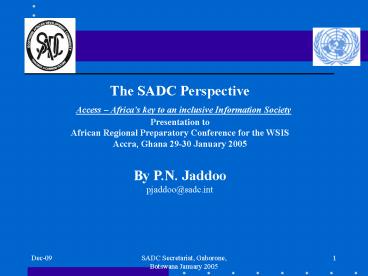UNCTAD Presentation - PowerPoint PPT Presentation
1 / 16
Title: UNCTAD Presentation
1
The SADC Perspective Access Africas key to
an inclusive Information Society Presentation to
African Regional Preparatory Conference for the
WSIS Accra, Ghana 29-30 January 2005 By P.N.
Jaddoo pjaddoo_at_sadc.int
2
SADC
SADC stands for SOUTHERN AFRICAN DEVELOPMENT
COMMUNITY. It is an economic community grouping
the following 13 countries ANGOLA NAMIBIA BOT
SWANA Democratic Republic of Congo SOUTH
AFRICA MALAWI SWAZILAND MAURITIUS TANZANIA M
OZAMBIQUE ZAMBIA LESOTHO ZIMBABWE
3
SADC
4
Objective
The objective of the grouping of the 14 countries
is to increase economic growth and reduce poverty
through higher levels of regional economic
integration. The specific objective is that all
countries in the region will become members of
the regional Free Trade Area by 2008 and a
Customs Union by 2012. EU is making grants
available to SADC under the 9th EDF for Regional
Integration and Trade, Transport and
Communications Infrastructure (including ICT)
initiatives as priorities in SADC.
5
Protocol
So far 20 protocols have been signed in SADC, 9
of which have been ratified and are under
implementation. The protocols cover a wide range
of areas relating to political, economic and
social areas of cooperation. Such as
Signed Entry in Force Education and
Training 08/09/97 30/07/2000 Trade
24/09/96 25/01/2000 Transport,
Communications and 24/08/96 06/07/1998
Meteorology
6
ICT
SADC focus has been on Telecommunications
Infrastructure as set up in its charter of 1992.
Telecommunications expansion is a key element to
development. In 1996, the SADC protocol on
Transport, Communications and Meteorology was set
up for restructuring the telecommunications
sector in the region Privatization,
Liberalization, and regulation. SADC plans to
review the existing protocols so as to put more
emphasis on Information And Communications
Technologies (ICT) rather than just on
Telecommunications Infrastructures.
7
Protocol Implementation
TRASA ( Telecommunication Regulators Association
of Southern Africa) was created to harmonize the
ICT legislation of the region. Some of the
guidelines are 1. Universal Access and
Service 2. Licensing Policy for
Telecommunications service 3. Fair Competition
for the ICT sector 4. Wholesale pricing in the
ICT sector More on http//www.trasa.org SATA (
Southern Africa Telecommunications Operators
Association) is an association of all SADC
Telecommunications operators. Its main objective
is to harmonize interconnectivity in terms of
setting up of radio, fiber, and microwave
backbone in the SADC region.
8
SATA-SRII
SADC Regional Information Infrastructure
Orange Short-Term High Priority RED
Medium-Term High Priority
9
SADC Initiatives
SADC ICT initiatives are the following 2000-
Policy guidelines on making ICT a priority in
turning SADC into an information-based
economy 2001- ICT declaration by SADC head of
states. 2002- Task force recommendations on ICT
strategy in SADC. 2003- Preparation of a
Draft Model legislative Provision for
electronic transaction and digital signatures
in SADC. 2004- Seek funding for an ICT action
plan (EDF 9)
10
Positive Results
11
Positive Results (more)
State-owned public telecommunications operators
in 12 Member States have been corporatized Public
Telecommunications operators in 6 member states
have been privatized All telecommunications
market segments ( private networks, ISPs, VANs,
mobile, etc. ) other than fixed-line,have been
liberalized in all Member States. Autonomous
regulatory authorities have been established in
11 member states Universal Service mechanism
have been established in 10 of the member states
12
SADC Strategic Development Plan
The Regional Indicative Strategic Development
Plan (RISDP 2003) defines SADCs vision, mission
and strategic objectives. A wider focus on ICT is
recommended to transform SADC into an
information-based economy with specific
objectives and deadlines. The ICT programme
within the RISDP contains a number of specific
projects with special emphasis on Human
Resource Development in ICT Policy and
Regulatory Support Applications ( e-business,
e-governent, Telemedicine, )
13
E-commerce Policy
Consensus in SADC The SADC Heads of States of
the 14 member states made a Declaration on ICT in
August 2001 whereby they made a commitment to
facilitate e-commerce WE SHALL UNDERTAKE to
work together to remove barriers to electronic
commerce in our SADC countries as a means to
opening opportunities and benefits such as
increased access to markets, opportunities to
create economic value from cultural assets,
reduced administrative costs, and improvement of
public services. There is a need to adopt and
adapt technologies that enable e-commerce
capability to avoid increasing exclusion from the
global economy Many SADC documents have
reiterated the same commitment.
14
National E-commerce Legislation
- Implementation at National Level
- 1. Republic of Mauritius
- The Information Technology (Misc. Provisions) Act
1998 - The Electronic Transaction Act 2000
- The Computer Misuse and Cybercrime Bill 2003
- http//www.gov.mu
- 2. Republic of South Africa
- Electronic Communications and Transactions Act,
2002 - http//www.gov.za
15
Challenges
1. Competitiveness - The high cost of ICT and
its limited access 2. Inadequate human capacity
in both managerial and technical areas 3.
Governments fail to engage private sector
participation in policy debates and in trade
negociations
16
For more information http//www.sadc.int pjaddoo
_at_sadc.int THANK YOU































